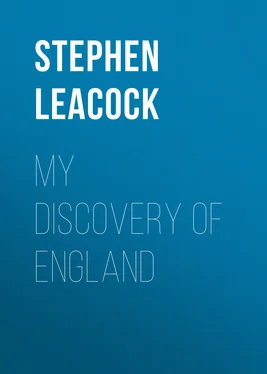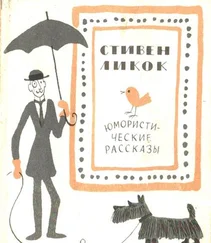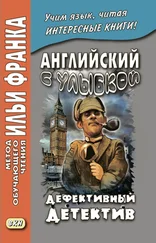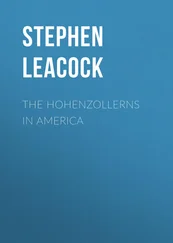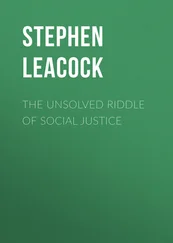Stephen Leacock - My Discovery of England
Здесь есть возможность читать онлайн «Stephen Leacock - My Discovery of England» — ознакомительный отрывок электронной книги совершенно бесплатно, а после прочтения отрывка купить полную версию. В некоторых случаях можно слушать аудио, скачать через торрент в формате fb2 и присутствует краткое содержание. Жанр: foreign_humor, Юмористические книги, foreign_antique, на английском языке. Описание произведения, (предисловие) а так же отзывы посетителей доступны на портале библиотеки ЛибКат.
- Название:My Discovery of England
- Автор:
- Жанр:
- Год:неизвестен
- ISBN:нет данных
- Рейтинг книги:4 / 5. Голосов: 1
-
Избранное:Добавить в избранное
- Отзывы:
-
Ваша оценка:
- 80
- 1
- 2
- 3
- 4
- 5
My Discovery of England: краткое содержание, описание и аннотация
Предлагаем к чтению аннотацию, описание, краткое содержание или предисловие (зависит от того, что написал сам автор книги «My Discovery of England»). Если вы не нашли необходимую информацию о книге — напишите в комментариях, мы постараемся отыскать её.
My Discovery of England — читать онлайн ознакомительный отрывок
Ниже представлен текст книги, разбитый по страницам. Система сохранения места последней прочитанной страницы, позволяет с удобством читать онлайн бесплатно книгу «My Discovery of England», без необходимости каждый раз заново искать на чём Вы остановились. Поставьте закладку, и сможете в любой момент перейти на страницу, на которой закончили чтение.
Интервал:
Закладка:
Looking around to find just where the natural service of the House of Commons comes in, I am inclined to think that it must be in the practice of "asking questions" in the House. Whenever anything goes wrong a member rises and asks a question. He gets up, for example, with a little paper in his hand, and asks the government if ministers are aware that the Khedive of Egypt was seen yesterday wearing a Turkish Tarbosh. Ministers say very humbly that they hadn't known it, and a thrill runs through the whole country. The members can apparently ask any questions they like. In the repeated visits which I made to the gallery of the House of Commons I was unable to find any particular sense or meaning in the questions asked, though no doubt they had an intimate bearing on English politics not clear to an outsider like myself. I heard one member ask the government whether they were aware that herrings were being imported from Hamburg to Harwich. The government said no. Another member rose and asked the government whether they considered Shakespere or Moliere the greater dramatic artist. The government answered that ministers were taking this under their earnest consideration and that a report would be submitted to Parliament. Another member asked the government if they knew who won the Queen's Plate this season at Toronto. They did,—in fact this member got in wrong, as this is the very thing that the government do know. Towards the close of the evening a member rose and asked the government if they knew what time it was. The Speaker, however, ruled this question out of order on the ground that it had been answered before.
The Parliament Buildings are so vast that it is not possible to state with certainty what they do, or do not, contain. But it is generally said that somewhere in the building is the House of Lords. When they meet they are said to come together very quietly shortly before the dinner hour, take a glass of dry sherry and a biscuit (they are all abstemious men), reject whatever bills may be before them at the moment, take another dry sherry and then adjourn for two years.
The public are no longer allowed unrestricted access to the Houses of Parliament; its approaches are now strictly guarded by policemen. In order to obtain admission it is necessary either to (A) communicate in writing with the Speaker of the House, enclosing certificates of naturalization and proof of identity, or (B) give the policeman five shillings. Method B is the one usually adopted. On great nights, however, when the House of Commons is sitting and is about to do something important, such as ratifying a Home Rule Bill or cheering, or welcoming a new lady member, it is not possible to enter by merely bribing the policeman with five shillings; it takes a pound. The English people complain bitterly of the rich Americans who have in this way corrupted the London public. Before they were corrupted they would do anything for sixpence.
This peculiar vein of corruption by the Americans runs like a thread, I may say, through all the texture of English life. Among those who have been principally exposed to it are the servants,—especially butlers and chauffeurs, hotel porters, bell-boys, railway porters and guards, all taxi-drivers, pew-openers, curates, bishops, and a large part of the peerage.
The terrible ravages that have been made by the Americans on English morality are witnessed on every hand. Whole classes of society are hopelessly damaged. I have it in the evidence of the English themselves and there seems to be no doubt of the fact. Till the Americans came to England the people were an honest, law-abiding race, respecting their superiors and despising those below them. They had never been corrupted by money and their employers extended to them in this regard their tenderest solicitude. Then the Americans came. Servants ceased to be what they were; butlers were hopelessly damaged; hotel porters became a wreck; taxi-drivers turned out thieves; curates could no longer be trusted to handle money; peers sold their daughters at a million dollars a piece or three for two. In fact the whole kingdom began to deteriorate till it got where it is now. At present after a rich American has stayed in any English country house, its owners find that they can do nothing with the butler; a wildness has come over the man. There is a restlessness in his demeanour and a strange wistful look in his eye as if seeking for something. In many cases, so I understand, after an American has stayed in a country house the butler goes insane. He is found in his pantry counting over the sixpence given to him by a Duke, and laughing to himself. He has to be taken in charge by the police. With him generally go the chauffeur, whose mind has broken down from driving a rich American twenty miles; and the gardener, who is found tearing up raspberry bushes by the roots to see if there is any money under them; and the local curate whose brain has collapsed or expanded, I forget which, when a rich American gave him fifty dollars for his soup kitchen.
There are, it is true, a few classes that have escaped this contagion, shepherds living in the hills, drovers, sailors, fishermen and such like. I remember the first time I went into the English country-side being struck with the clean, honest look in the people's faces. I realised exactly where they got it: they had never seen any Americans. I remember speaking to an aged peasant down in Somerset. "Have you ever seen any Americans?" "Nah," he said, "uz eeard a mowt o' 'em, zir, but uz zeen nowt o' 'em." It was clear that the noble fellow was quite undamaged by American contact.
Now the odd thing about this corruption is that exactly the same idea is held on the other side of the water. It is a known fact that if a young English Lord comes to an American town he puts it to the bad in one week. Socially the whole place goes to pieces. Girls whose parents are in the hardware business and who used to call their father "pop" begin to talk of precedence and whether a Duchess Dowager goes in to dinner ahead of or behind a countess scavenger. After the young Lord has attended two dances and one tea-social in the Methodist Church Sunday School Building (Adults 25 cents, children 10 cents—all welcome.) there is nothing for the young men of the town to do except to drive him out or go further west.
One can hardly wonder then that this general corruption has extended even to the policemen who guard the Houses of Parliament. On the other hand this vein of corruption has not extended to English politics. Unlike ours, English politics,—one hears it on every hand,—are pure. Ours unfortunately are known to be not so. The difference seems to be that our politicians will do anything for money and the English politicians won't; they just take the money and won't do a thing for it.
Somehow there always seems to be a peculiar interest about English political questions that we don't find elsewhere. At home in Canada our politics turn on such things as how much money the Canadian National Railways lose as compared with how much they could lose if they really tried; on whether the Grain Growers of Manitoba should be allowed to import ploughs without paying a duty or to pay a duty without importing the ploughs. Our members at Ottawa discuss such things as highway subsidies, dry farming, the Bank Act, and the tariff on hardware. These things leave me absolutely cold. To be quite candid there is something terribly plebeian about them. In short, our politics are what we call in French "peuple."
But when one turns to England, what a striking difference! The English, with the whole huge British Empire to fish in and the European system to draw upon, can always dig up some kind of political topic of discussion that has a real charm about it. One month you find English politics turning on the Oasis of Merv and the next on the hinterland of Albania; or a member rises in the Commons with a little bit of paper in his hand and desires to ask the foreign secretary if he is aware that the Ahkoond of Swat is dead. The foreign secretary states that the government have no information other than that the Ahkoond was dead a month ago. There is a distinct sensation in the House at the realisation that the Ahkoond has been dead a month without the House having known that he was alive. The sensation is conveyed to the Press and the afternoon papers appear with large headings, THE AHKOOND OF SWAT IS DEAD. The public who have never heard of the Ahkoond bare their heads in a moment in a pause to pray for the Ahkoond's soul. Then the cables take up the refrain and word is flashed all over the world, The Ahkoond of Swat is Dead.
Читать дальшеИнтервал:
Закладка:
Похожие книги на «My Discovery of England»
Представляем Вашему вниманию похожие книги на «My Discovery of England» списком для выбора. Мы отобрали схожую по названию и смыслу литературу в надежде предоставить читателям больше вариантов отыскать новые, интересные, ещё непрочитанные произведения.
Обсуждение, отзывы о книге «My Discovery of England» и просто собственные мнения читателей. Оставьте ваши комментарии, напишите, что Вы думаете о произведении, его смысле или главных героях. Укажите что конкретно понравилось, а что нет, и почему Вы так считаете.
